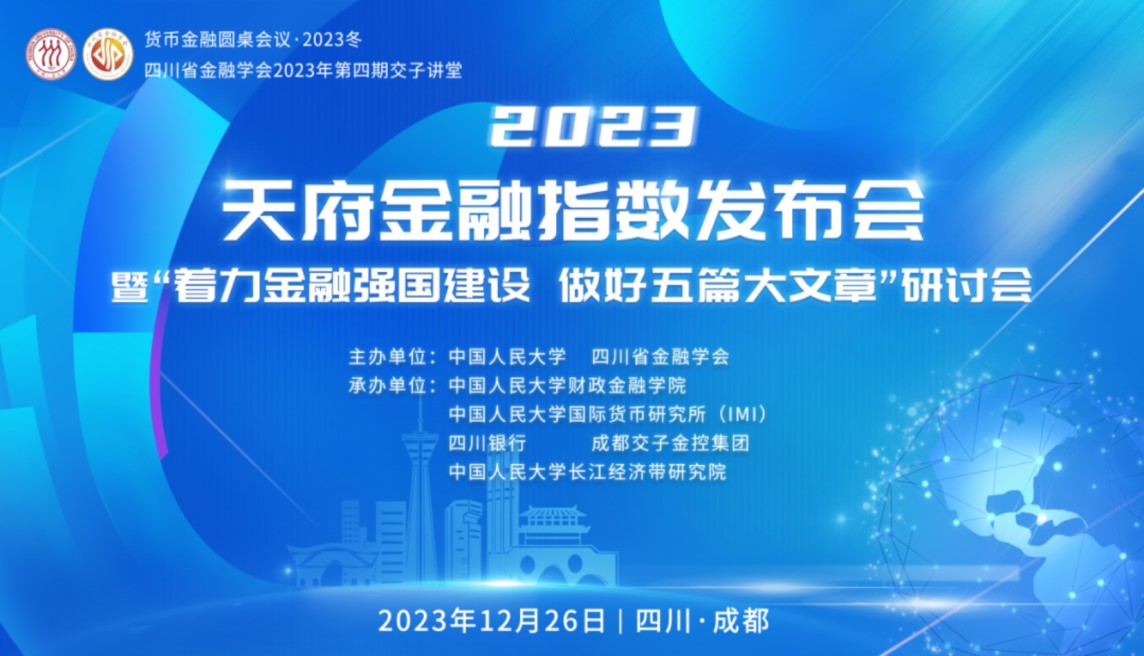2023 Tianfu Financial Index (TFFI) Launch Meeting and Roundtable on Money and Finance·Winter 2023
2024-01-12 IMI

On December 26, 2023, the 2023 Tianfu Financial Index (TFFI) Launch Meeting: Building a Financial Power, Addressing Five Major Areas was jointly hosted by Renmin University and the Sichuan Provincial Financial Association in Chengdu. This event also served as the Money and Finance Roundtable · Winter 2023 and the fourth session of the Sichuan Provincial Financial Association’s 2023 lecture series, co-hosted by School of Finance and the International Monetary Institute (IMI) of Renmin University (RUC), Sichuan Bank, Chengdu Jiazi Financial Holding Group, and the Yangtze River Economic Zone Research Institution of RUC.
Ouyang Zehua, Vice Chairman of the Sichuan Provincial Committee of the Chinese People’s Political Consultative Conference (CPPCC) and Minister of the Financial Regulatory Administration of Sichuan Province, and Feng Shizheng, member of the CPC Renmin University Committee and Vice President of Renmin University, attended the meeting and delivered opening remarks. Yan Baoyu, Chairman of the Sichuan Provincial Financial Association and Sichuan Provincial Bank of People’s Bank of China (PBOC), and Liu Xiaoliu, member of the Chengdu Municipal Committee and Executive Deputy Mayor, were also present. Over 200 participants, including representatives from Renmin University, relevant government departments of Sichuan Province and Chengdu City, financial regulatory authorities, leaders of financial institutions, experts from higher education institutions, and representatives from industry associations and companies, attended the event.
Guo Biao, Professor of the School of Finance of RUC and Assistant Director of National Financial Research Academy, presented the 2023 TFFI report. Guo explained that the index, officially released, was compiled with the support of the Sichuan Provincial Financial Association and Sichuan Bank, led by the International Monetary Institute (IMI) of RUC The index evaluation system includes a total index, two indices, and eight sub-indices. According to the Report, the top ten cities are: Beijing, Shanghai, Shenzhen, Guangzhou, Hangzhou, Chengdu, Nanjing, Chongqing, Wuhan, and Tianjin. Overall, the financial index of the 35 central cities shows an upward trend, with rankings displaying some differentiation. Some cities demonstrate steady progress in financial development, while others continuously optimize their financial supply structures, achieving significant results in high-quality financial development. Shanghai's position as an international financial center continues to strengthen, with Shenzhen and Guangzhou experiencing an increase in index scores and broad prospects for financial industry development. Hangzhou and Wuhan are enhancing financial development through human resources, improving quality and efficiency. Chengdu and Chongqing show notable effects in supporting the construction of the Chengdu-Chongqing economic circle. Fuzhou, Changchun, and Shijiazhuang optimize the business environment, promoting healthy development in the financial industry. Xi'an, Nanchang, and Urumqi focus on key areas, further enhancing the financial empowerment of the real economy.
In this Report, Chengdu ranks 6th in the overall index score. Specifically, the rural financial sub-index has held the 1st position for seven consecutive years, with significant advantages in rural financial foundation and development. The cultural financial sub-index ranks 3rd, showing vigorous development momentum and notable progress in cultural financial foundation and development. The human resources sub-index ranks 4th, and the financial institutions sub-index and green finance sub-index rank 6th, indicating stable development. Continuous efforts are needed in financial markets, employment environment, and financial technology.
The TFFI index integrates theory, policy, and practice, encompassing 35 major cities of the first and second tiers. It objectively reflects the overall situation of financial development in each central city, as well as the development in areas such as financial markets, financial institutions, employment environment, human resources, financial technology, green finance, cultural finance, and rural finance. This contributes to a better understanding of financial development in each city, facilitating differentiated competition and coordinated development. So far, the TFFI index has been successfully compiled and released for seven editions.
The roundtable discussion was chaired by Huang Jicheng, Deputy Director of Applied Finance Department from the School of Finance of RUC. Zheng Ye, Governor of Sichuan Bank; Xiao Geng, Professor, Shenzhen Finance Institute, the Chinese University of Hong Kong; President, Hong Kong Institution for International Finance, Yang Tao, Deputy Director, National Institution for Finance & Development, Tu Yonghong, Dean of the Yangtze River Economic Zone Research Institution of RUC and Deputy Director of IMI, and Jiang Yongmu, Dean of the School of Economics of Sichuan University engaged in the discussion.
Translated by Xie Sainan
